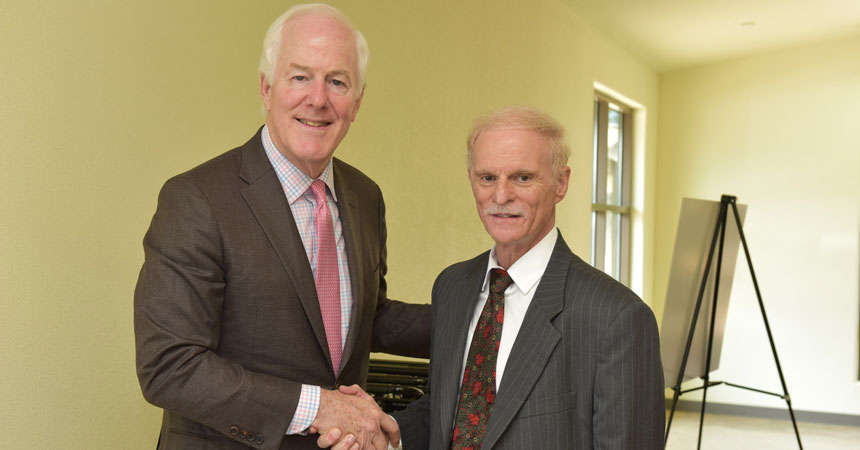CHI helps eliminate sexual assault evidence backlog
By Jan Jarvis
By the time Lavinia Masters’ rape kit was tested, more than 20 years had passed since she was assaulted. By then, the statute of limitations for the crime had expired.
Through the work of the UNT Center for Human Identification, such scenarios are becoming fewer and are expected to be reduced even more.
“No victim should have to wait months or years to have sexual assault evidence analyzed,” said Dr. Bruce Budowle, Executive Director for the UNT Center for Human Identification. “If we identify the perpetrator early on, we can prevent this person from committing another sexual assault, thus sparing one, or many, from becoming a victim.”
Dr. Budowle spoke during a gathering of advocates, government officials and leaders to discuss legislation that would reauthorize funding to help eliminate a backlog of rape kits in Texas and nationwide. The group, including U.S. Sen. John Cornyn, visited the Gatehouse woman’s crisis center in Grapevine to draw support for the Debbie Smith Act, which re-authorizes funding through 2024. Although the legislation passed the Senate unanimously in May, it awaits action by the House of Representatives. Current funding runs out in September.
The Lavinia Masters Act, which the Texas Legislature passed in June, addresses the rape kit backlog in Texas. It calls for rape kits to be tested within 90 days of receiving the evidence.
“No victim should have to go through life not having answers,” said Masters, an advocate for the law.
Backlogged rape kits have been an issue in Texas and other states for many years. In 2011, Texas public safety official estimated there were more than 20,000 kits that had not been tested. As of 2017, there were 2,138 untested rape kits in Texas, according to the Texas Department of Public Safety Crime lab.
Over the past eight years, the Debbie Smith Act has helped Texas reduce its rape kit backlog by 90 percent, Sen. Cornyn said. The bill was introduced in 2004 to provide crime laboratories with the resources to end the backlog of untested DNA evidence from unsolved crimes
“We will continue to work at the federal and state level to ensure victims of sexual assault have the resources they need,” Sen. Cornyn said. “This is something we all can support.”
With only six analysts in the past year alone, the UNT Center for Human Identification has completed almost 1,600 criminal cases of which more than 1,200 were sexual assault cases, Dr. Budowle said.
Over 1,000 DNA profiles were entered into the national DNA database CODIS, and of those, there were 479 hits, or matches.
“This work over the last year alone has supported 34 submitting agencies from 13 counties, predominantly Dallas, Harris, Travis and Tarrant,” Dr. Budowle said.
“Texas needs to improve its laboratory infrastructure to accommodate the backlog and continuous onslaught of cases,” he said. “The Center is going to expand and turn its successful program into an even larger successful program.”







Social media